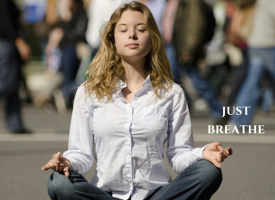Mindfulness and Calming the Mind Part 3

Passive practice is commonly known as Sitting. This is the formal practice of Mindfulness, which can be done alone or in groups. For this you need to sit and practice quiet internal observation of thoughts and body sensations, without reacting to them.
Important points to remember when sitting:
- Regular practice, time and place. If you can get in the habit of practicing at the same time and place your practice will get stronger, deeper and easier to maintain.
- Correct posture. Sitting straight, but relaxed not rigid, neck straight, back straight, feet flat on the floor, hips higher than knees if possible, unless sitting on the floor in Lotus (cross legged).
- Comfortable clothing. Preferably loose comfy clothes, but really it can be done wearing anything at anytime.
Last week we focused on the first two types of Passive Practice, Progressive Muscle Relaxation and Mindfulness of Breath. Today we will focus on The Body Scan and the Benefits of practicing Mindfulness.
Body Scanning
- To begin with you will focus all of your attention to the entrance of your nostrils as for Awareness of Breath. Each time you notice a thought, you bring your attention straight back to the sensation at the entrance of your nostrils.
- Once you have done this for two to three minutes, you will begin to scan the body systematically, from the top of the head to the tips of your toes and if you are feeling up to it, you can then scan from the tips of toes to the top of your head.
- To start with you scan with 10cm diameter circles and as you get more practiced at this you can scan more like a ripple spreading. As you move to each part of the body, you are noticing the sensations there. Please note that you are not thinking about the sensations, just noticing these feelings such as itching, tingling, heat and so on.
- If you notice a thought, you will bring your attention back to the part you are scanning and when you feel a sensation move on to the next part.
- If you are in a particular spot for a while and feel no sensations, you will move on anyway and maybe next time you may notice some.
- If you feel a sensation elsewhere on your body, bring your attention straight back to the part your scanning and move on when you feel a sensation.
- As you keep practicing you will develop an ability to feel both intense and more subtle sensations whilst purposefully not reacting to your habitual thoughts and feelings.
- This entails a systematic desensitisation to whatever internal experience is encountered on the way (comfortable or uncomfortable) and brings with it acceptance, peace and calm. Emotions can only exist through body sensations. When you regulate emotions, it is easier to make rational decisions. Not avoid.
By continued practice, the neural pathways of the sensory areas of the brain and the frontal lobe are strengthened, causing greater calmness, concentration, focus and clarity. The Neural Pathways of the hind, more prehistoric part of the brain are weakened creating less emotional reacting and rumative thought.
Benefits of Mindfulness Practice
- Appreciation of all experiences
We learn to accept and embrace everything, not just the experience we want, enjoy or find pleasant. This helps us develop a true appreciation for all of life’s experiences.
- Understanding reality experientially
We begin to acknowledge every moment for what it is; transitory and impermanent.
- Realising we cannot control life.
By beginning to observe the thoughts and sensations that arise as we practise, we realise how little control we really have over our life experiences.
- Allowing nature to unfold as it is.
When we stop resisting what is, we build our level of acceptance and understanding, plus we are no longer giving energy to our unpleasant experience’s, allowing them to pass on in a much less stressful way.
- Developing an objective perception.
By developing this ability we can begin to look at life through the bigger picture. We can distance ourselves from the story we are telling, to be able to see it for what it really is. They are just thoughts.
Happy Practicing! Feel free to contact me for tips or with questions anytime you need.
Jaye :-)




